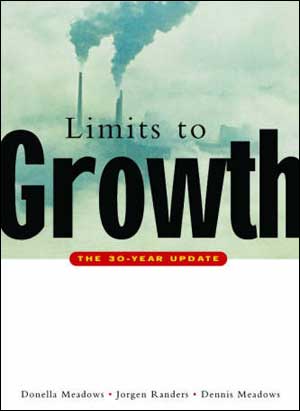Dennis Meadows Wins Japan Prize
Posted by Big Gav in limits to growth
Energy Bulletin reports that Dennis Meadows, one of the authors of The Limits to Growth has won this year's Japan prize - 2009 Japan prize honors lead author of ‘"The Limits to Growth".
Dr. Dennis Meadows, lead scientist and co-author of The Limits to Growth (1972) and its subsequent updates, is the winner of this year’s Japan Prize from the Science and Technology Foundation of Japan for “Transformation towards a sustainable society in harmony with nature.” This prestigious award is given once a year to people from all parts of the world whose original and outstanding achievements in science and technology are recognized as having advanced the frontiers of knowledge and served the cause of peace and prosperity for humankind. It carries a cash award of 50 million yen (about $500,000) and will be awarded during a Japan Prize Awards week in April 2009.
In 1972, three young scientists from MIT used systems dynamic theory to create a computer model (“World3”) that analyzed global resource consumption and production. Their report, funded by the Club of Rome and published as The Limits to Growth, created an international sensation and acquainted millions with the fact that large-scale industrial activities and population growth could destroy their own foundations—confronting global society with the very real prospects of self-inflicted collapse. It was an international bestseller, with over 30 million copies sold worldwide.
Later voted to be one of the 20th century’s ten most-influential environmental books, the text was the object of intense criticism by economists of the time. They dismissed it as Malthusian hyperbole. But events over the past three decades have generally been consistent with the book’s scenarios. The Limits to Growth later served as the foundation for “The Global 2000 Report to the President” as well as UN’s Brundlandt Commission.
Matthew Simmons, economist and founder of the world’s largest private energy investment banking practice, recently wrote, “The most amazing aspect of the book is how accurate many of the basic trend extrapolations . . . still are some 30 years later.”
Since its initial publication, Meadows, along with the late Dr. Donella Meadows and Dr. Jorgen Randers, has twice authored updates published by Chelsea Green: Beyond the Limits in 1992, and Limits to Growth: The 30-Year Update in 2004. In these updates, an improved world model was used to point out that the limiting features of the earth’s physical capacity, about which The Limits to Growth had sounded a warning, have continued to deteriorate, and that the time left for solving the problem is growing short; the authors urged that mankind not delay in taking the measures necessary to address the situation.
At the time of publication of Limits to Growth: The 30-Year Update, Lester Brown, Director of the Earth Policy Institute said, “Reading the 30th-year update reminds me of why the systems approach to thinking about our future is not only valuable, but indispensable. Thirty years ago, it was easy for the critics to dismiss the limits to growth. But in today’s world, with its collapsing fisheries, shrinking forests, falling water tables, dying coral reefs, expanding deserts, eroding soils, rising temperatures, and disappearing species, it is not so easy to do so. We are all indebted to the ‘Limits’ team for reminding us again that time is running out.”
Since the initial publication of The Limits to Growth, Dr. Meadows has continued to study the causes and consequences of physical growth on a finite planet. Among his numerous endeavors, he co-founded the Balaton Group, a famous environmental research network, and he has published many educational games and books about sustainable development that are used around the world.






